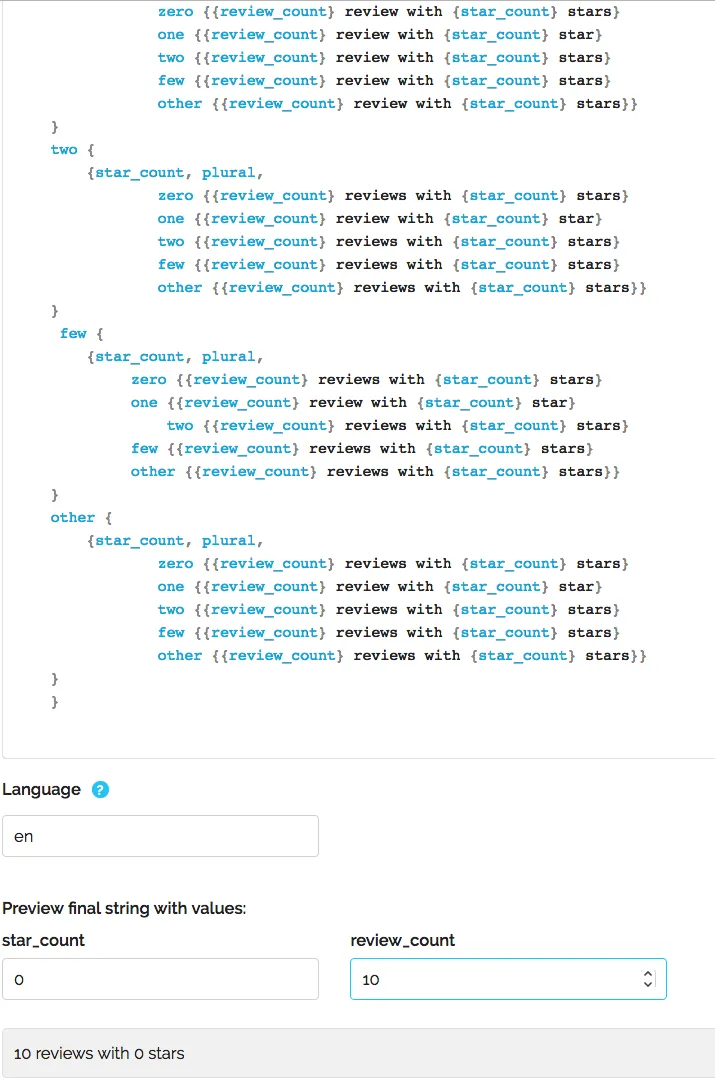你在这里有一个嵌套复数的情况。虽然我对Ruby的熟悉程度很基础,但我找不到任何文档提供通过Ruby内置的i18n功能解决这个嵌套复数情况的解决方案。然而,在支持
ICU库的编程语言中,可以从
MessageFormat中受益。
使用Ruby的
此库进行MessageFormat解析和格式化,可以手工制作一个嵌套的MessageFormat来覆盖所有这个字符串的变化,以涵盖任何语言中的嵌套复数规则的复杂性。请记住,大多数语言都不需要这些规则,但有一些语言(如阿拉伯语和俄语)需要许多这些情况;阿拉伯语有特殊的两个情况,俄语有特殊的单数情况(1、21、31、1001,但不包括11)。Unicode CLDR项目的图表列出了所有语言的复数规则,可以在
这里找到。
通常情况下,我会指导翻译人员使用
这个在线工具(它来自于
message-format-rb的同一开发者),并根据其所需语言的需要进行MessageFormat翻译。

这是一个完整的、最大化的MessageFormat,下面是一个Ruby代码片段:
{review_count, plural,
=0 {
{star_count, plural,
other {no reviews}}
}
zero {
{star_count, plural,
zero {{review_count} reviews with {star_count} stars}
one {{review_count} review with {star_count} star}
two {{review_count} reviews with {star_count} stars}
few {{review_count} reviews with {star_count} stars}
other {{review_count} reviews with {star_count} stars}}
}
one {
{star_count, plural,
zero {{review_count} review with {star_count} stars}
one {{review_count} review with {star_count} star}
two {{review_count} review with {star_count} stars}
few {{review_count} review with {star_count} stars}
other {{review_count} review with {star_count} stars}}
}
two {
{star_count, plural,
zero {{review_count} reviews with {star_count} stars}
one {{review_count} review with {star_count} star}
two {{review_count} reviews with {star_count} stars}
few {{review_count} reviews with {star_count} stars}
other {{review_count} reviews with {star_count} stars}}
}
few {
{star_count, plural,
zero {{review_count} reviews with {star_count} stars}
one {{review_count} review with {star_count} star}
two {{review_count} reviews with {star_count} stars}
few {{review_count} reviews with {star_count} stars}
other {{review_count} reviews with {star_count} stars}}
}
other {
{star_count, plural,
zero {{review_count} reviews with {star_count} stars}
one {{review_count} review with {star_count} star}
two {{review_count} reviews with {star_count} stars}
few {{review_count} reviews with {star_count} stars}
other {{review_count} reviews with {star_count} stars}}
}
}
和 Ruby 代码片段:
require 'message_format'
require 'test/unit/assertions'
include Test::Unit::Assertions
icumf = "{review_count, plural, =0 {{star_count, plural,other {no reviews}}} zero { {star_count, plural, zero {{review_count} reviews with {star_count} stars} one {{review_count} review with {star_count} star} two {{review_count} reviews with {star_count} stars} few {{review_count} reviews with {star_count} stars} other {{review_count} reviews with {star_count} stars}}}one {{star_count, plural, zero {{review_count} review with {star_count} stars} one {{review_count} review with {star_count} star} two {{review_count} review with {star_count} stars} few {{review_count} review with {star_count} stars} other {{review_count} review with {star_count} stars}}} two {{star_count, plural, zero {{review_count} reviews with {star_count} stars} one {{review_count} review with {star_count} star} two {{review_count} reviews with {star_count} stars} few {{review_count} reviews with {star_count} stars} other {{review_count} reviews with {star_count} stars}}} few {{star_count, plural,zero {{review_count} reviews with {star_count} stars} one {{review_count} review with {star_count} star} two {{review_count} reviews with {star_count} stars} few {{review_count} reviews with {star_count} stars} other {{review_count} reviews with {star_count} stars}}} other {{star_count, plural, zero {{review_count} reviews with {star_count} stars} one {{review_count} review with {star_count} star} two {{review_count} reviews with {star_count} stars} few {{review_count} reviews with {star_count} stars} other {{review_count} reviews with {star_count} stars}}}}"
# Set the locale to get the plural rules for that locale
message = MessageFormat.new(icumf, 'en')
assert_equal message.format({ :review_count => 0, :star_count => 0 }), 'no reviews'
assert_equal message.format({ :review_count => 0, :star_count => 100 }), 'no reviews'
assert_equal message.format({ :review_count => 1, :star_count => 2 }), '1 review with 2 stars'
assert_equal message.format({ :review_count => 2, :star_count => 5 }), '2 reviews with 5 stars'
